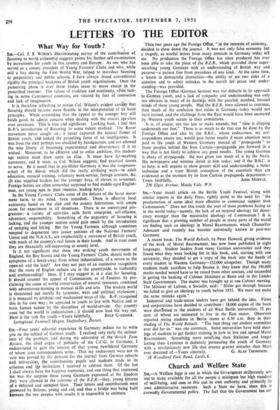LETTERS TO THE EDITOR
What Way for Youth ?
SSA,—Col. J. S. Wilson's discriminating survey of the contribution of Scouting to world citizenship suggests points for further self-examination by movements for youth in this country and Europe. As one who has served as a county president of Young Farmers' Clubs and who, while still a boy during the First World War, helped to introduce ScOuting to preparatory and public schools, I have always found conventional rigidity the principal weakness of British youth organisations. Once the pioneering phase is over these bodies cease to move except in the prescribed routines. The values of tradition and continuity, often lack- ing in some Continental countries, are vitiated by fear of innovation and lack of imagination.
It is therefore refreshing to notice Col. Wilson's evident anxifty that Scouting should become more flexible in the interpretation of its basic principles. While contending that the appeal to the younger boy still holds good, he admits concern when dealing with the crucial age-class over seventeen. This is true and significant. Looking back, I feel that B.-P.'s introduction of Rovering to some extent misfired. The Rover movement never caught on ; it never captured the natural flower of British youth, and lacked the propelling force of an intelligentsia. It was from the start perhaps too shackled by headquarters, and not allowed the wise liberty of becoming experimental and diversionary if it so wished. Moreover, to be effective and to enlist ambition, this student- age section must draw upon an elite. It must have far-reaching autonomy, and it must, as Col. Wilson stiggests, find practical causes to serve. Be it noted that in pre-Hitler Germany it was the lungmann- schaft of the Biinde which did the really civilising work—in adult education, musical training, voluntary work-service, foreign contacts, &c. (It also supplied leaders for the younger boys of eleven to seventeen. Foreign Scouts are often somewhat surprised to find middle-aged English- men, not young men in their twenties, leading boys.) In the Young Farmers' Clubs some of the defects of the Scout move- ment have, to my mind, been remedied. There is effective local autonomy based on the club and the county federations, with ample room for experiment in all directions. There is no stereotyped pro- gramme: a variety of activities calls forth enterprise, self-reliance, adventure, responsibility. Something of the pageantry of Scouting is lacking, and the younger section could gain much by the introduction of camping and hiking. But the Young Farmers, although sometimes tempted to degenerate into junior sections of the National Farmers' Union and the N.A.A.S., are emphatically a movement of British youth, with much of the country's real future in their hands. And in most cases they are -financially self-supporting at county level. Is it not significant that these two striking youth movements of England, the Boy Scouts and the Young Farmers' Clubs, should both be symptoms of a break-away from urban industrialism, of a return to the open-air and the land? Are they not part of an instinctive recognition that the roots of English culture are in the countryside, in husbandry and craftsmanship? Here, if I may suggest it, is a clue for Scouting. It should counter the appeal of Communism, as of Fascism, by pro- claiming the cause of world conservation of natural resources, combined with adventurous training in manual skills and arts. The modern world is threatened not merely by tyrannies, wars and political explosions ; it is menaced by artificial and mechanised ways of life. B.-P. recognised this in his own way ; he appealed to youth to live with Nature and to train human nature by the disciplines of world-service. Our country once led the world in industrialism ; it should now lead the way out.
Here is the task for youth.—Yours faithfully,. ROLF G ARDINER. Springhead, Fontniell Magna, Shaftesbury, Dorset.


































 Previous page
Previous page